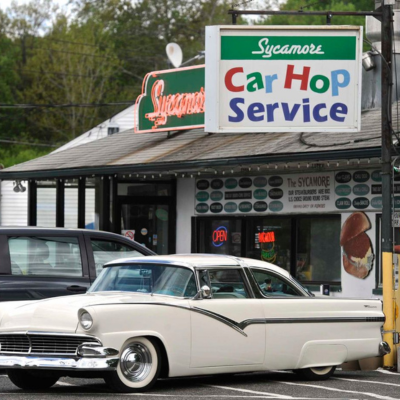As a young person, Deb Kelleher really didn’t set out to make foster care her life’s work. Later, drawing on the inspiration of her grandmother, Kelleher worked for more than two decades in a variety of child-services roles and then launched the Waterbury-based Annie C. Courtney Foundation in 2014.
The foundation recently conducted a workshop with Bethel’s Social Services department to recruit foster parents, and aims to improve child welfare for the children of Northwestern Connecticut. It is named for Kelleher’s late grandmother, Anna Gudelinis Courtney. The eldest of eight children in a New York City family, “Annie” became the family’s caregiver after both parents died. She remained in that role until the youngest child reached adulthood.
The love, kindness, and sense of humor Courtney displayed to everyone she encountered served as an inspiration to Kelleher in starting the Annie C. Courtney Foundation. It seeks to prevent kids from needing foster care in the first place – and offers a helping hand when they do.
“About half of the kids whose family lives are disrupted will go to the homes of relatives – the same kind of ‘informal care’ my grandmother provided,” said Kelleher. “But the other half need foster families, and that’s where organizations like ours can help.”
“Connecticut is better off than most states”, Kelleher pointed out. There are approximately 3,200 kids in the state’s foster-care system, less than one percent of the total 368,500 such children nationwide.
“Connecticut is considered one of the country’s model child welfare systems,” said Kelleher. “We’re quite good in comparison to states such as California, which has been known to rent gymnasiums to house the large number of foster kids in their system, and Washington state, which has had to rent hotel rooms for kids.”
“Still, the bulk of our work goes to finding homes for foster kids,” she continued. “It has gotten much harder to find people to become foster parents. Until 2022, for instance, the state Department of Children and Families sought to place siblings in the same foster homes – but because of the decrease in people who now come forward to be foster parents, that’s no longer feasible. At the end of the day, DCF must find a place for all these kids to lay their heads at night.”

Throughout the state, 10 non-profit organizations work to meet that challenge, including the Annie C. Courtney Foundation. Not every person is cut out to be a foster parent. In an age in which the term “gentle parenting” has come into vogue and the old adage about “sparing the rod” has faded into oblivion, many view the role with misgivings.
“You are, after all, being put in a role of parenting someone else’s kids,” Kelleher said. Once they apply, prospective candidates must undergo a rigorous series of in-depth interviews and background checks. There are also lengthy training sessions and workshops, which are conducted by DCF.
Some who apply later drop out because they find the process to be too daunting. Those who do complete all the necessary requirements become licensed for the role.
Although the goal is to provide every child with a stable living situation, the foster-care system depends mightily on a stopgap network of temporary foster homes. These children need a place to live temporarily while something awaits resolution with their birth families – whether that’s for a few days, or a few weeks. “Our organization and others like ours work to help these kids out, too,” Kelleher said.

Bethel’s Jennifer and Bill Seeley are among those couples who have provided a loving home to dozens of youngsters from the surrounding area. “Because the DCF’s goal is usually to reunify families, we went into this with the full understanding that our role might be quite temporary,” said Jennifer, who is the executive director of Amos House, a transitional housing and shelter program for women with children that is based in Danbury. Bill Seeley is a retired Marine who now teaches at the Bridgeport Naval Academy.
“Our first experience was for just four days during a holiday period,” said Jennifer. “Due to a health issue her husband experienced, a mother needed someone to take care of her daughter while she was away – and we were able to step up.”
The Seeleys have opened their doors chiefly to elementary-school-aged children. They’ve shied away from fostering teens, making an exception for those for whom their home is a stop on the way to a longer-term placement. They usually have at least one child in their home at any given time, and they are currently fostering two children.
Besides providing a place to live and food to eat, the role is just as complex as parenting a child of one’s own. Some kids arrive with educational or behavioral deficits, which require special care and patience. DCF licenses some foster parents to care for children with severe handicaps, or require a special feeding regimen, as well as asthma or life-threatening allergies, diabetes, and other health conditions.
As they seek to regain custody, the natural parents often undergo their own treatment – for issues such as emotional instability or substance abuse. “We just care for their kids in the meantime,” said Jennifer. “The foster-care system is super-short on homes currently, so a lot of times we take in children on very short notice.”
Both Bill and Jennifer were initially hesitant to become foster parents. “There are so many unknowns, especially if you don’t have children of your own,” she said. “But we did it and our lives are better for it.”
Stories of foster kids tend to emphasize hardship – but there are success stories, too. Among those, Deb Kelleher adopted three of her foster kids. The oldest is in his late 30s and is now married; he lives around the corner from Kelleher in Cheshire. Her two other foster children, in their 20s, still live in her home. Kelleher also has a son of her own, who is now in his early 40s.
That raises a sore spot among foster-care advocates: What happens to kids who “age out” of the system? Young people can remain in foster care until age 23, provided that they attend college full time.
Kelleher’s group is embarking on one solution. It recently purchased three condos in a newly remodeled Waterbury building, which will help the young adults who occupy the condos to develop independent living skills.
Such stories provide a glimmer of hope for what many regard as a broken system. The writer Rob Henderson is one of those, and his life story brought the issue into clearer focus on the national scene. Born in 1990 to a mom who abused drugs, Henderson lived in multiple California foster homes through age seven, when he was adopted by a family from the northern part of the state.
Though his adoptive mom and dad divorced, in his book “Troubled,” Henderson credited the stability he experienced in that home with setting him on a path that included service in the U.S. Air Force, a degree from Yale, and a doctorate from Cambridge. In Henderson’s view family stability should be the goal of the foster-care system – and society as a whole.
Kelleher, the Seeleys, and all the others involved in foster care aim for similar happy outcomes. Moreover, they emphasize that fostering kids is beneficial for children and adults alike.
“I’ve been lucky in that I’ve had some truly great kids live with me,” Kelleher said. “I wouldn’t change anything about my experience for anything in the world.”
_______________________________________________________________________________________________________________________________________________
An important first step in learning more about becoming a foster parent is to contact the Connecticut DCF at (888) KID-HERO (888-543-4376 or by email at KidHero@cafafct.org. You can reach out to Kelleher at the Annie C. Courtney Foundation at (475) 235-2184. On the Web go to https://www.anniec.org/contact-us-2/. More locally, you can also contact Megan Alworth-Khazadian, Bethel’s director of social services. Her contact number is (203) 794-8537; email alworth-khazadianm@bethel-ct.gov.






060324.png)
.png)


